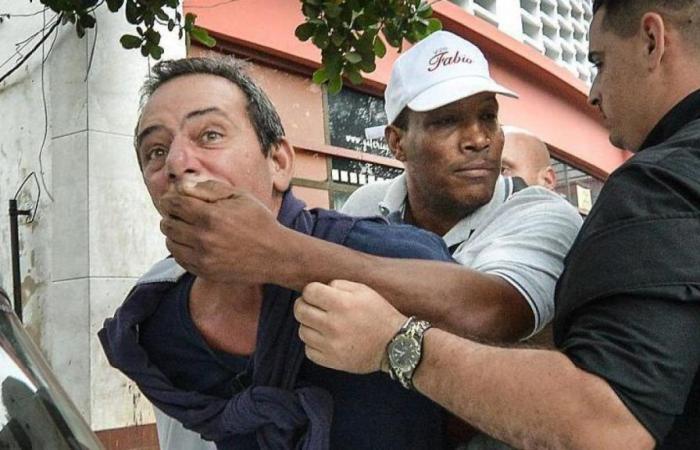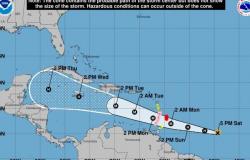
Seven hundred paper leaflets fly from a balcony at a busy intersection in the popular Centro Habana neighborhood.
It is 11 in the morning on Monday, June 14, 2021.
Many passers-by walk by indifferently, while others pick up the pamphlets to read their contents.
“The people demand free elections”, “Freedom for political prisoners”, “Thinking differently is not a crime”, “Down with communism” or “The time has come” are some of the slogans printed along with quotes from Cuban heroes José Martí and Antonio Maceo.
Less than 24 hours later, journalist and dissident Lázaro Yuri Valle Roca, who had co-organized and filmed this protest act, was arrested.
It is the beginning of his passage of three years for Cuban prisons that he describes as “hell.”
The opposition member was arrested and imprisoned after organizing and filming this leaflet launch (YouTube screenshot)
Photo:Deliberate
Rock Valley He received freedom in exchange for exile to the United Stateswhere he arrived at the beginning of June with his wife, the activist Eralidis Frómeta.
From the home of a relative in Philadelphia, where they have temporarily settled, he tells BBC Mundo about the precarious conditions in prisons, the degrading treatment and the attacks suffered.
BBC contacted Cuban government representatives by phone and email to obtain their position on the alleged abuses in the prison system and the specific case of Valle Roca, but received no response.
Havana, in any case, has always denied that human rights violations are committed in its prisons.
The Dungeon
Valle Roca, 63, is a well-known activist with a long history of opposition to the communist system in force in Cuba since the 1959 Revolution that brought Fidel Castro to power.
As a journalist, he collaborated with several media outlets, including the opposition Radio and TV Martí based in Miami, and together with his wife in 2018 he founded “Delibera”, a small platform with content against the Cuban government and pro-democracy.
Lázaro Yuri Valle Roca is the grandson of Blas Roca (1908-1987), an important figure in Fidel Castro’s regime, and nephew of Vladimiro Roca (1942-2023), a famous opponent.
Photo:Rock Valley
Despite his criticism of the regime for almost three decades, until 2021 the longest time he had spent locked up, he says, was 15 days in a police cell in Havana.
But in June of that year he decided to move from words to action: “We had already prepared the leaflets. I was in charge of filming “What was done while my partner was throwing the papers,” he recalls.
Delibera published the recording of the pamphlet launch in a YouTube video.
The next day, Valle Roca was arrested and taken to the Villa Marista barracks, headquarters of the State Security apparatus (counterintelligence) of the Ministry of the Interior, where, according to his account, They beat him up and put him in a cell..
There he spent the first 50 days of his confinement “without medication and eating poorly, since the police confiscated all the food my wife brought me,” he says.
Villa Marista is known for being the place where opponents arrested in Havana are interrogated and detained.
Photo:Radio clock
From his cell he learned about the almost unprecedented protests of July 11, 2021 – the largest in six decades in Cuba – “because of what my jailers were saying, they were very nervous and commenting on what was happening.”
“Knowing that the people had taken to the streets gave me strength, I felt like I had to be alive.“I couldn’t die,” he says.
After 50 days in Villa Marista, he was transferred to the Combinado del Este maximum security prison, on the eastern outskirts of Havana, and was informed of the charges against him: “enemy propaganda” and “resistance”the latter for allegedly opposing the arrest, something he denies.
The jail
Combinado del Este, which houses some of the prisoners imprisoned for political reasons, is one of the most feared prisons from Cuba.
It ranked first on the list of reports of rights violations in penitentiary centers compiled this month by the Cuban Prison Documentation Center.
The NGO denounced the “critical health situation, lack of medicines and terrible medical care” of this and other prisons on the island, as well as the hunger and harassment suffered by the inmates.
Recent testimonies suggest that the serious economic crisis that Cuba is suffering – with a pressing shortage of food and medicine – is reducing the rations provided to the prison population to the minimum necessary to survive.
Exterior of the Combinado del Este maximum security prison.
Photo:Getty Images
In his video call with BBC Mundo, Valle Roca shows a small white plastic cup and points out that it is about a third full.
“This is the rice ration that they give you at Combinado del Este, along with a kind of mince that is all water and smells bad. In the rice You can find everything from insects to parts of mice or lizards“, it states.
The dissident explains that he was given tiny rations to eat twice a day, plus a glass of juice for breakfast.
Lázaro Yuri Valle Roca looks thinner and more emaciated today compared to the photographs before his time in prison, in which went from weighing about 80 kilos to just 53, as he claims.
“I had no medical assistance of any kind. I had my treatment for hypertension but they didn’t provide it to me, they didn’t even give me aspirin,” he laments.
He claims that, in addition to hypertension, in prison he contracted sclerosis in the aorta, chronic pneumonia and a cyst in the gallbladder, as well as a deviated septum from a beating by a guard.
“He treated us in a degrading way. One day I talked back and he came up to me and hit me,” she says.
This is what the cells look like in Combinado del Este.
Photo:Getty Images
The trial
After a year behind bars, Valle Roca’s trial was held in a Havana court in June 2022, where prosecutors were asking for 6 years in prison for him.
“Everything was irregular. There were diplomats and press who wanted to go and were not allowed. I had put witnesses and they were not summoned.”says the journalist.
International institutions and organizations have repeatedly questioned the legitimacy of judicial proceedings in Cuba.
The UN recently issued a letter based on a report by the NGO Prisoners Defenders in which it denounces, among other irregularities, the deprivation of liberty without judicial protection, the lack of independent lawyersthe subordination of justice to political power and the misuse of military courts and summary proceedings.
This conditions all criminal cases in the country and, more specifically, the fate of prisoners sentenced for acts of dissidence, most of them detained as a result of the historic protests of July 11, 2021.
Since July 11, it has become common to see special forces patrolling the streets of Havana.
Photo:Getty Images
Those demonstrations were followed a campaign of police summons, arrests, trials and imprisonments to citizens critical of the government that lasts until today, according to organizations.
Prisoners Defenders counted in May More than 1,100 political prisoners in the island’s prisons, including dozens of minors, serving sentences under harsh conditions for crimes such as “sedition”, “contempt”, “enemy propaganda” or “sabotage”.
The Cuban government denies that there are irregularities and assures that its judicial system is clean and impartial.
In July 2022, Lázaro Yuri Valle Roca He received his sentence: 5 years in prisonof which I had already completed one.
Exile
After almost three of his five years of his sentence, the United States Embassy in Havana granted him a humanitarian visa and the Cuban authorities agreed to release him in exchange for him leaving the country.
“Since he was arrested, they told me that if he agreed to leave Cuba, he would not be tried. Both he and I refused to leave and he chose to be tried. But three years later, his health reached its limit and the best option was to leave Cuba. save Lazarus’ life and accept the proposal“, his wife, Eralidis Frómeta, explains to BBC Mundo.
On June 6, the couple arrived at the Miami airport, and shortly after they headed to Philadelphia.
Although they are safe in exile, they are worried about possible reprisals against their family on the island.
“We know what our family is exposed to, because one of the things the police told us is to remember that we left my daughter and grandchildren behindthat we saw what we were going to do here in the United States,” says Frómeta.
Asked about his new life plan in the North American country, Lázaro Yuri Valle Roca answers that for now he will need to undergo medical and psychological treatment to heal the after-effects of his three years in prison.
In the future, he does not rule out resuming his political struggle.
“Let’s see how we do it, because anyway I am going to continue fighting“I will have something in mind. I will look for something that I can do to contribute to ending this dictatorship,” he proclaims.
And remember that you can receive notifications in our app. Download the latest version and activate them.





